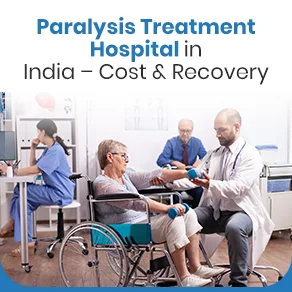
At IBS Hospital, Endoscopic Brain Surgery represents a leap in neurosurgical precision and patient care. Utilizing the latest minimally invasive techniques, our skilled surgeons expertly address complex brain conditions, offering enhanced recovery and reduced risk, thereby redefining excellence in neurosurgery.



What are Endoscopic Brain Surgeries?
Endoscopic brain surgeries offer a non-invasive or minimally invasive approach for treating complex brain lesions and tumors. This technique involves the use of specialized equipment known as an endoscope, which is introduced through natural openings, such as the nostrils, or via a small incision. The endoscope is a narrow, flexible tube equipped with a camera at one end. This camera captures real-time images that are displayed on an enlarged screen, allowing doctors to have a magnified view of the surgical site. Using these images, surgeons can precisely guide their tools to treat tumors and lesions in the most complex areas of the brain. Endoscopic brain surgeries are known for their significantly high success rate and better prognosis.
What are the various conditions for which an Endoscopic Brain Surgery is performed?
Endoscopic Brain Surgery may be performed to assess and treat the following conditions:
Hydrocephalus: This condition is characterized by the abnormal accumulation of cerebrospinal fluid in and around the brain ventricles, leading to increased skull pressure. An endoscopic approach may be used to implant a shunt at the base of the ventricle to drain the fluid.
Tumors: Malignant or benign growths can develop in any part of the skull due to abnormal genetic mutations. Endoscopic surgery may be performed to extract well-defined or localized tumors from various and difficult areas of the brain.
Cysts and Cystic Lesions: Cysts, fluid-filled lesions that can develop in any part of the brain, can block the flow of cerebrospinal fluid and lead to hydrocephalus. The endoscopic approach can treat these cysts or cystic lesions and relieve associated symptoms.
Intraventricular Lesions: These include tumors and cysts that develop within the brain’s ventricles and obstruct the flow of cerebrospinal fluid. Endoscopy can assess and treat such lesions without open surgery.
Biopsies: The endoscopic approach can remove tissue samples from various brain areas for biopsies, determining the nature of brain lesions. This is a safe and effective method for diagnosing brain malignancies.
Arteriovenous Malformations (AVMs): These abnormal connections between arteries and veins disrupt the flow of oxygenated blood to surrounding cells and tissues. Endoscopic techniques can locate and treat AVMs with minimal invasion.
What are the advantages of an Endoscopic Brain Surgery?
- The surgery is minimally invasive, ensuring minimal to no post-surgical complications.
- The recovery period is comparatively shorter.
- Hospital stays are relatively brief, with patients typically discharged within a day or two.
- Potential brain trauma is significantly reduced.
- There is minimal to no scarring.
- It enables doctors to access even the most difficult areas of the brain.
IBS Hospital Empowers Your Treatment with Cutting-edge Technology
We continuously incorporate cutting-edge technologies from around the world into our offerings, such as a surgical system that allows for precise and confident complex procedures. We use magnetic stimulation to treat certain neurological conditions and create personalised brain maps for tailored treatment plans. Nerve monitoring during surgeries ensures the nervous system is not compromised, and a robotic exoskeleton aids in mobility issues. Our goal at IBS Hospital is to provide the best care possible, utilising the latest and most innovative technologies available.







